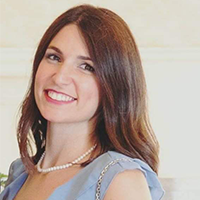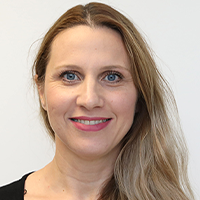The theme of International Women’s Day, this year, is #choosetochallenge. In this month’s NewsHub edition we wanted you to meet some of MFSA's inspiring women. Patricia Attard Darmanin, Vanessa Mangion, Roshan Mohnani and Lorraine Vella are four members of the MFSA team who each have their own story to share with regard to women’s role in society and the challenges that they face.

Patricia Attard Darmanin – Senior Manager, Communications
Patricia is in possession of a Bachelor of Psychology, Honours degree (B.Psy Hons) and has been working at the MFSA for two years. She recently became a mother for the first time and is now phasing her return to the office, whilst caring for her young daughter.
How important were the family friendly measures that the MFSA has in place for you?
In the same way that the events of 2020 were beyond anyone’s foresight, having a pandemic baby was something I could have never even imagined. Even before I started singing lullabies and changing diapers, my transition to a home office was very smooth back in March 2020, when the MFSA took the decision to protect vulnerable and pregnant employees by enabling them to work exclusively from home. The remote access technology which was already in place helped me follow through my commitments before I commenced my maternity leave. The MFSA also offers new mothers the opportunity to spend a year off from work to be with their children and get the most out of this unique experience. As much as I was looking forward to spending precious time with my first born, six months in, I also felt a need to use my brain power on things which go beyond measuring the right dose of formula milk or keeping a record of the time between one feed and another. Thanks to the flexibility of working a reduced number of hours from home I could challenge my baby brain while giving a contribution to my team.
What are the challenges that a woman faces when trying to juggle work and family life?
Sometimes I am amazed at how people who have two or more children manage, especially when they have to do the cleaning, cooking, ironing and all the in-betweens of daily life. I think it is fundamental for men to understand that their involvement in housework and in taking care of children is also their duty. I am lucky to have a husband who pitches in, but in all honesty, I still feel that there is this deeply seeded expectation for a mother to be nothing short of Wonder Woman. Ultimately, it’s the mentality which needs to change and starting early is key. Not only for men - women should also start expecting more of their male counterparts, as well as out of society in general, and demand it.
What would you recommend to other employers who are still unsure whether to introduce family-friendly measures in their workplace?
The pandemic has amplified, also with urgency, the need for workplaces to be more adaptive in the face of new realities such as the one we’re living through at the moment. It is high time that this would also hold true for a reality which has been around for decades, but often ignored – that of working parents (not only mothers). To this day, I am still surprised to see a number of companies who, on the one hand, project a contemporary and authentic image but all the while are, sadly, light years behind in adopting measures which promote a healthy work-life balance – ones which support parents in being the best they can be at home, so that they can give their utmost also at work.

Vanessa Mangion – Senior Software Developer, Technology
Vanessa holds a Bachelor of Science in Software Development and has been working at the MFSA for the past four years
Your work mainly focuses on technology. How have you seen women’s role in the world of technology change in our society?
Technology has one of the greatest gender gaps when compared to other industries. I believe that the reason for the current gender gap is the fact that we tend to experience gender bias from a very early age. Boys tend to be more inclined and encouraged to choose STEM (Science, Tech, Engineering & Maths) related subjects when compared to girls. Luckily, awareness and opportunities have greatly increased in this industry and we can already experience a small change in the imbalance.
It’s only just recently that women have been appointed executive positions in Tech and I believe that they would serve as great role models to younger women that are still studying and considering different career paths. For me personally, it has always been a motivating factor to see big corporations, such as Facebook and YouTube, appointing women in important roles.
Have you faced any hurdles being a woman in a male-dominated industry?
I have been fortunate enough to have never experienced gender discrimination during my career. I get along very well with all my colleagues and we make a really good team. Having said that, there are still major improvements to be made in the Tech industry and these can only be done if some mentalities are changed. When I was still studying, a particular lecturer had said that he believes that men tend to be better at software development just because he thinks they’re more logical. These kinds of statements set us up against the constant need to prove ourselves and could affect one’s confidence.
What advice would you give young women who have just entered the working sphere?
My first piece of advice is to be confident. Believe in yourself and don’t sell yourself short. It’s commonly known that women can under-assess their capabilities. Addressing this will improve who you are and what you can offer. At the same time, don’t be afraid to ask questions and admit that you may not know something. It’s very healthy to ask others to share what they know, and people tend to be keen on helping when genuine interest is shown. Learning about new things in Tech is a requirement to keep up with the forever-changing trends. Finally, make new friendships, grow your network and learn from the successes and failures of others.

Roshan Mohnani – Analyst, Conduct Supervision
Roshan Mohnani has had a rich and varied career. She initially graduated in Commerce, did her Post graduate Diploma in Systems Analysis, and then after a short career break to raise her children, she switched careers and graduated with an MBA. Following that she moved to the MFSA in 2020.
How have you seen women’s role in the working force change during the years?
I have seen a drastic change. I come from a conservative, yet very progressive, family in India. My parents gave more importance to education than money or anything else. They always said ''People can take your money, but no one can take your qualifications away''. My mum is a graduate (BA in Psychology) but chose to be a stay-at-home mum like most women of her generation. When I graduated with a Bachelor’s degree in Commerce, I asked my dad if I could join the family business. He was reluctant because none of the other female members of our family were working back then. So, I opted to emulate my male cousins instead, and started studying for a post-grad diploma in Systems Analysis along with my best friend from school. My parents were happy to provide me with all the support I needed for this. Eventually, my friend and I were both offered jobs teaching COBOL programming on that same post-graduate course. When he heard of this job offer, my dad did a quick turn-around, and offered me a job in his shop, so I could work for the family business instead. However, I was adamant and accepted the post with the IT school. This may have caused a bit of a stir because I was the first female in our extended family to ever have worked, and to have done so outside of home. It was not uncommon amongst females, especially in the South of India, but it certainly was a first for my family and I think I ended up making my dad proud!
When I got married and came to Malta, there weren’t any job opportunities to teach coding back then. I did however find a role in IT training, teaching software applications like spreadsheets and word-processing to corporate clients. Then, when my kids came along, I decided to take a break. I remember my employer had offered to open a creche at work for me and another female colleague – but this did not actually materialise. Today I look in awe at many of my younger colleagues and see how they juggle their time between work and family, caring for elderly parents and/or young kids and I’m really impressed.
How hard is it to start a career from scratch once you've already been established in a former career?
I guess it depends on your willingness to learn and your support systems. I found this support in terms of my husband, the house-help I had when the girls were very young, and also the availability of learning resources and accessibility to institutes accredited with international credentials in Malta. I also found invaluable moral support from my best friend from school. When I felt it was time to move on and study again, it was my young daughters who encouraged me, and with immense support from my husband I did a two-year general diploma at the University of Malta. I made new friends and picked up every-day digital skills from my 18-year-old classmates during assignments. That’s when I realised you can learn something from everyone, every day. I remember, it was the girls who found a newspaper advert for me for an executive position in IT sales and marketing and encouraged me to apply. A few years after working in Business Development, I felt the need to acquire new skills and move on. My girls had grown by then and four years ago I started studying for an MBA at the University of Malta. With the help of a recruitment agent, I moved into a new sector yet again whilst studying for my degree in the evenings. Each time I moved, it became clear, that you can’t get anywhere unless you are willing to give up your ego and learn from scratch. Age does not count – it's just about the willingness to learn.
What are the challenges that a woman faces when trying to juggle work and family life?
The word 'juggle' is apt here – it’s cliched, but most women do feel pangs of guilt when they focus on themselves, their studies or their work after the kids come along. When our girls were little, I moved away from the demands of a constantly changing field and worked part-time in English teaching till the girls were almost teenagers before I went back to studying again. Today, looking back, I feel a woman should not have to leave her profession and give up working for a span of several years to bring up her kids. Using your support systems is key. The cliché ‘’Quality and not Quantity’’ is spot on. Having said that, I still maintain, that in the very early years, parents need to be hands-on.
What would you advise women who would like to find a balance between their work and family life?
It's impressive the way women in Malta (and in India) successfully manage their family and work-life these days. If I could, I would tell my younger self exactly that – make use of all the support systems that are available. Do not try to be Wonder Woman and do everything by yourself. Be there for your family/ kids in the early years but remember to schedule at least an hour or two a day to continue to educate yourself. E-learning platforms, part-time university courses and even vocational institutes – make use of them. And when you can, inch back into the workforce, even if it is for a few hours a day. You may choose to pause your career, but you certainly do not need to leave the industry, unless you want to. You can make use of return-to work schemes and continue to soar whilst caring for your home and family. We owe it to ourselves to keep on learning and keep that fire burning!

Lorraine Vella - Deputy Head, Securities and Markets Supervision
You have been at MFSA for over 20 years. How have you seen women’s role in the working force change?
I cannot really say that I have seen women’s role in the Authority’s working force change as I have never observed distinction in the progress of any employee at the Authority based on gender. Gender equality has never been an issue at the Authority and during these 20 years I have seen colleagues, both male and female, progress equally in their careers at the Authority.
What are the challenges that a woman faces when trying to juggle work and family life?
The main challenge that a woman faces is a cultural one. The majority of the Maltese are very traditional. Most of us, especially in my age bracket, have most probably experienced a household where the wife/mother is the main responsible party for chores and kids whilst the husband/father has a full-time job. When you grow up in that environment, unconsciously you feel guilty that you are not fulfilling that traditional role. Personally, my main challenge is this everyday internal conflict where automatically I feel guilty for working instead of spending time tending to the needs of my family in the traditional way and vice versa. Keeping a balance is very difficult!
What advice would you give young women who have just entered the working sphere?
I would give the same advice I would give to young men … whatever you do in life, follow your passion and do what you love and you will not work a day in your life.

